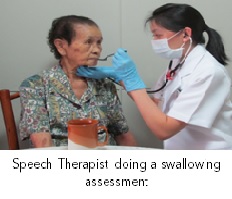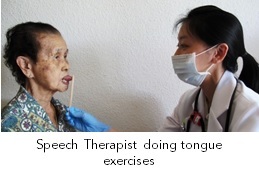Download English PDF, 1.48MB, PDF
Download Chinese PDF, 1.26MB, PDF
What is Dementia?
Dementia describes a set of symptoms that may include memory loss and difficulties with thinking, problem-solving or language.
Dementia is not part of normal ageing, although the elderly are more prone to becoming demented.
The two most common types of dementia are Alzheimer’s Dementia and Vascular Dementia.
What are the Signs and Symptoms of Dementia?
You may observe people with dementia having more difficulties over time with:
- Performing daily activities e.g. difficulty
going to the toilet or bathroom by themselves, dressing, eating and drinking - Behavior e.g. becoming easily worked up and more quick-tempered
- Cognition e.g. becoming forgetful, easily distracted and becoming more disorganized
- Language e.g. having difficulty naming objects, difficulty understanding instructions/ conversation
These changes may worsen slowly with the progression of dementia and may be different from person to person.
How Will People With Dementia Benefit From Speech Therapy?
People with dementia and their caregivers commonly face these problems:
- Communication difficulties for the person with dementia
- Communication difficulties with care-givers
- Eating, drinking, and swallowing difficulties
Speech and language therapy can help give patients the tools to address these challenges.
Speech Therapists can provide specialist assessment of eating, drinking, and swallowing disorders and provide management strategies for mealtime and intake of food/drink.

How Does Dementia Affect Swallowing?
The swallowing abilities of people with dementia may be affected due to their decreased sensory and motor function, changes to awareness and understanding of eating and drinking, and behavioral changes.
You may find them showing the following signs and symptoms when they eat or drink:
- Loss of appetite due to lesser ability to taste
- Holding food in mouth without swallowing
- Coughing/ choking when eating and drinking
- Taking a long time to finish meals
- Attempting to eat non-edible items
- Refusing food
- Forgetting to eat or forgetting they have eaten
- Losing the ability to feed independently
The above changes may lead to health risks such as:
- Malnutrition
- Dehydration
- Food/fluids entering the airway, which may lead to chest infection
How Will Speech Therapy Help With Swallowing Problems?
- The Speech Therapist will assess the swallowing ability of the person with dementia.
- For some people, further assessment such as a Videofluoroscopy study (VFS) or a Fibreoptic Endoscopic Evaluation of Swallowing (FEES) may be needed.
- After the assessment, they will provide recommendations of diet and fluid consistencies which are safe for swallowing, and strategies to aid the feeding process of the person with dementia.

The recommendations may include:
- Changing fluid consistencies or food textures
- Adjusting their postures when they eat/drink
- Doing exercises to improve or maintain their swallowing function
- Using feeding techniques and/or swallowing strategies to ensure safe feeding and swallowing
- For example:
- Remove distractions and interruptions during mealtime
- Encourage self-feeding if possible
- Remove non-edible items from meal table
- Feed using teaspoon amounts
- Using other feeding methods such as using a nasogastric (NG) tube.
